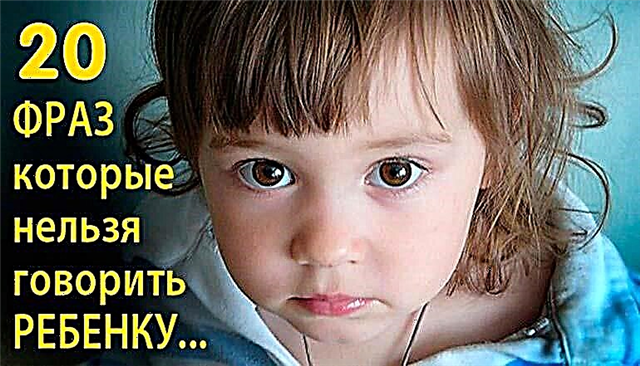Family psychologist Svetlana Merkulova told AiF.ru how just one carelessly thrown phrase can make your child a notorious person.

How to make a child become an excellent student? Of course, compare him to a successful classmate. How to calm your child if he has a hysteria in a public place? Promise to be whipped at home with a belt. Parents often use these “ingenious” methods. And when they grow up downtrodden and unadapted children, they begin to lament how it happened.Family psychologist Svetlana Merkulova I am sure that even one carelessly thrown phrase can have a strong effect on the psyche of a little person, therefore, when communicating with your child, you should carefully choose words. She told AiF.ru which expressions are better for forgetting to mothers and fathers forever.
1. At your age I studied perfectly
From birth to six years old, mom and dad for a child are practically gods who know everything. They form the baby's attitude to the world and to himself personally. Specifically in this phrase, you can see the competition between the parent and the child, he seems to say to his child: “You will never reach me! No matter how hard you try, I am better than you. " Children who grow up with this attitude, as a rule, prove to the family that they are good all their lives. Of course, by saying these things, you are really stimulating the narcissistic part of the child's psyche, which provokes him to achieve certain goals. But the trouble is that, in the end, a person achieves something not for himself, but for mom and dad, so that they finally see that he is worthy of them. Growing up, such children never rejoice at their successes, joy comes only if the parent recognizes their achievements, but he is unlikely to do it.
2. You are my chicken, monkey, piglet
As soon as loving parents call their children. All this leads to the depersonalization of the child, as if he is not there, but there is some kind of toy with which you can do whatever your heart desires. At the beginning of his life, your son or daughter will perceive any spoken word uncritically, they will trust you. Tell the child that he is a fool instead of “you need help, let me explain,” and the child will accept it. Let me give you an example when a mother, in an educational impulse, told her son that he was a coward. As a result, when meeting the boy, he introduced himself like this: "My name is Vanya Ivanov, I am a coward." When you hear this, it should be an incentive to think about how you communicate with your own child. A person's name is his presentation to the world. In some families, it turns out that it moves in and a lot of funny names for the child are invented, but in vain! The name should always be in the foreground, this is how a person will subsequently feel himself in this world, how complete he will be. If you more often call a daughter or son a chicken or a devil, then you kind of bite off pieces on his behalf (on his personality).
3. Look, Katya has an A for the test, and you have an A
Most parents do everything with the best of intentions. Most likely, the parents themselves had such an experience in childhood, and then they say: "It's okay, they told me so too, I grew up, look how wonderful I am." They were able to “forget” how painful it is when mom or dad rejects you and says, “Katya is better than you.” This is a very painful experience that children often carry into their adult life. They then begin to hate this Katya. It is always unpleasant for a child to be compared to someone else, a classmate, brother or sister. Such, already adults, always continue to compare themselves with others and are always not in their favor.
4. Since you behave like this, I don't love you.
Or I can only love you when you fit me. After this phrase, the child begins to try his best to be correct, he pushes all his needs and desires, "grows" in himself a kind of antenna that guesses the desires and expectations of parents. As a result, the child does not exist. In adult life, he tries to please all the time, he lives with the attitude: “I want to be loved, and for this I have to please. I will not have my own desires, but I will have desires of other people. "
5. Don't disgrace me
In other words, the parent says, "You are my shame." Children, who often hear such a phrase, really want everyone to see who they really are, while if they receive someone's attention, they do not know what to do with it. They hide, close, get lost. Such a child seems to have no choice, he can only be someone's shame. Saying something like this will hurt your own little one.
6. You are just like a father (mother)
Of course, this phrase illustrates the relationship between dad and mom, their dissatisfaction with their life together, which they take out on the child. That is, the spouses do not directly sort out the relationship, but through their child they say some nasty things to each other. And all these nasty things remain in the child. If mom says, "You are as stubborn as your dad." It turns out that dad is a bad person with whom it is impossible to agree. Now let's think if the boy wants to be such a man, because he is stubborn and bad? When we project our bad relationships onto our children, they have to live with it. On the other hand, in this phrase he can hear the subtext that "girls are better than boys." Parents use this manipulation if there is a struggle for the child and he needs to choose the side of either dad or mom.
7. Do not finish the porridge - you will be weak and stupid
I had a girl friend who was told from childhood: "If you don't finish your bread, he will run after you all night." No matter how ridiculous it may sound, she was terribly afraid of bread, that is, her parents achieved the opposite effect. Such phrases are also pure manipulation. Very often they are used by grandparents who faced hunger in childhood. Then they are passed on from generation to generation unnoticed for us. In a child, such an expression can develop fears or a very difficult relationship with food, its cult, excess weight, etc.
8. If you misbehave, we will give you to your uncle (babayka)
This is a very specific message that says that a child is valuable only if it is comfortable for its parents. A parent broadcasts to his child: "Don't be yourself, you must be the way you suit us." Growing up, such children do not know what they want and try to please everyone and everyone.
READ ALSO:

9. You will get it at home!
This is about the fact that the parent has the right to do whatever he wants with the child, without referring to his feelings. In a second, mom or dad turns into a parent-guardian who punishes or forgives. Children, who often hear such an expression in their address, do not easily develop relationships with their superiors, since the parental figure seems to stick together with the figure of the boss, and the person begins to fear the boss and at the same time wants to please him so as not to be punished. But, as a rule, the management feels a similar attitude and in response begins to "spread rot" such a subordinate.
10. Leave so that I don't see or hear you
I translate: “You ruined my life, disappear! You shouldn't be. " And subsequently, such children live with a deep sense of guilt before the parent, for the fact that he (the child) prevented the parent from living happily. We must be careful with such statements, since a person can carry their load all his life. In general, before you say something to your child, you need to think carefully. Many adults do not hear what they are saying; it would be useful for them to at least sometimes hear themselves from the outside. Now there are many gadgets, record your speech and carefully study how you address your child, what words you say to him. I assure you that you will make a lot of discoveries, and perhaps not the most pleasant ones.



